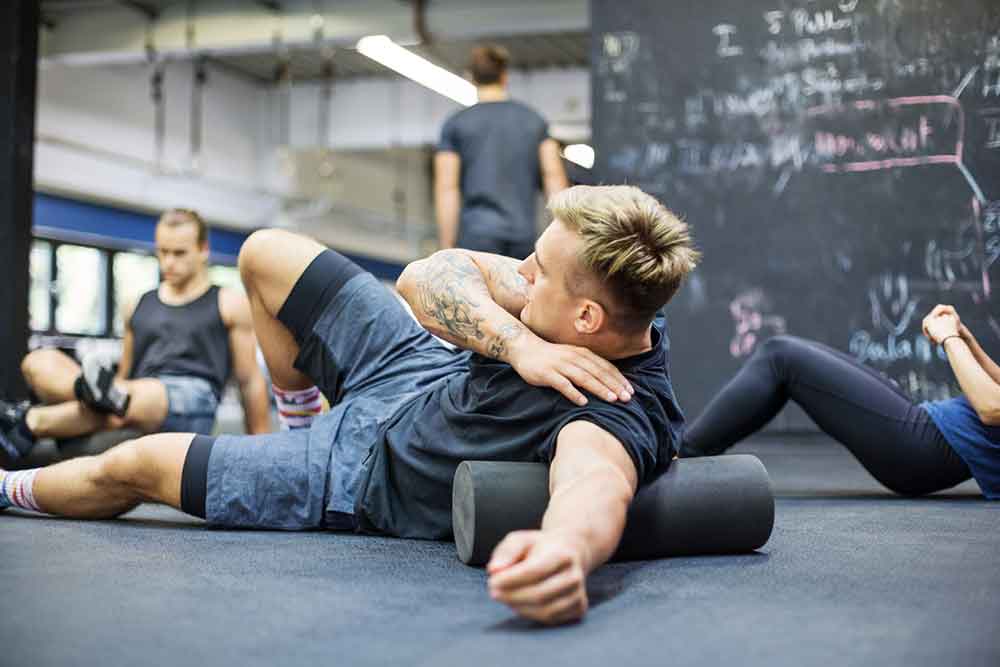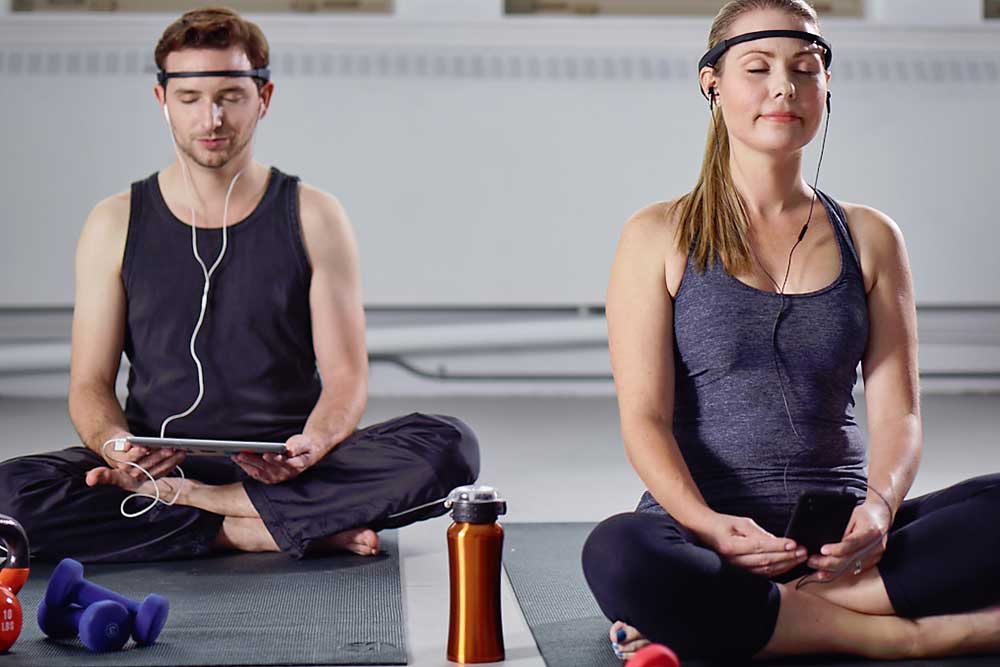Are There Benefits to Working out on Cannabis?

Not so long ago, merely suggesting that there could be any benefit to exercising on cannabis would have been absurd – but with its recent legislation, and a growing body of research exploring its many potential health benefits, this is not as crazy as it first seemed.
In fact, there is some recent research suggesting that this is indeed the case.
Are Cannabis Users More Active Than Non-Users?
So, the first thing I wanted to touch on revolves around the physical activity levels of regular cannabis users. Believe it or not, there is some very interesting research showing that regular weed smokers tend to have markedly higher activity levels than their non-stoner counterparts (YorkWilliams, 2019).
In fact, this research has shown that those who use marijuana before or after exercise participate in approximately 40 more minutes of aerobic exercise and 30 more minutes of strength training per week than those who do not.
Crazy information really!
And what is even more important is the fact that marijuana users also happened to exceed the World Health Organization’s recommendations of a minimum of 150 minutes aerobic exercise per week by around 10 whole minutes – which is much better than those who do not use cannabis.
In short, this research indicates that marijuana users are more likely to meet the physical activity guidelines for health than those who do not use on a regular basis.
Can Cannabis Make Exercise More Enjoyable?
We now know that in modern day cannabis users are more typically more active than non-users. But why is this the case?
Well, fortunately for us, this same study also happened to explore the reasons why cannabis users seemed to exercise more than others – and there was one reason that seemed to stand out time and time again.
And is because regular marijuana smokers believe that cannabis makes exercise more enjoyable. Yep, it appears that people who exercise on cannabis find it to be more fun than those who exercise stone cold sober.
Which may not come to a surprise to many of you…
Cannabis and Focus
What about benefits? I mean, are there benefits to working out high?
And the answer may surprise you, being maybe – but it seems to depend on whether you use the drug regularly, or not (Crean, 2011).
See, there is a growing body of research showing that cannabis has the potential to increase attention and focus. However, this only occurs if you are what can be considered as a regular cannabis user.
Conversely, if you don’t smoke cannabis on the regular, then it will have the opposite effect.
This interesting research indicates that while some of the compounds found in cannabis may have the potential to enhance focus and cognition, there is an apparent learning effect associated.
Ultimately, your body needs to ‘get used’ to having it in your system before it can be used to enhance exercise performance.
Related Article: The Crucial System Responsible For Runner’s High
Endorphins and Cannabis: What you need to know
You might be wondering why exercising under the influence of cannabis so much fun? And the answer comes down to these little compounds known as endorphins.
Endorphins are little chemicals that are produced naturally by your nervous system. They are super impressive because they reduce sensations of pain and increase sensations of happiness. See, when these guys are secreted by your nervous system, they enter your brain, where they act upon cannabinoid receptors.
It is the stimulation of receptors that create that ‘feel good’ sensation associated with exercise – which is why this feeling is commonly described as exercise endorphins runner’s high (Raichlen. 2012).
Now, what in the world does this have to do with cannabis? I mean, does cannabis produce endorphins like exercise does?
And in short, yes it does – well, kind of anyway.
Cannabis contains these unique little compounds known as endocannabinoids. Much like the endorphins secreted during exercise, they also act on the cannabinoid receptors found within your brain (Atakan, 2012).
In this manner, both have the potential to impact mood positively, increase happiness, and even cause a euphoric sensation.
What is the Endocannabinoid System?
Before I move onto f this information in a little more detail, I wanted touch on what is known as the endocannabinoid system (or the ECS for short) (Lu, 2016).
The ECS is an extremely complex cell-signaling system that was first identified in the early 1990s by researchers who wanted to determine the effects of cannabis on the brain. While numerous researchers are still in the process of identifying the many roles that the ECS has in the body, we do know for a fact that it is integral to health and function, where it plays a role maintaining:
- Sleep
- Mood and emotional wellbeing
- Hunger regulation and appetite
- Memory and focus
- Reproduction and fertility
Now, within this, it is important to note that the ECS is actually made up of three distinct parts:
- Compounds known as endocannabinoids and cannabinoids (some of which are made in your body, and some of which are found in plants like cannabis).
- Receptors throughout your body that endocannabinoids and cannabinoids bond with (like the ones in your brain that we spoke about earlier).
- Enzymes that help break down endocannabinoids and cannabinoids.
So, not only is the ECS a completely normal part of your body, it is also a very important one. It is also the system that explains why cannabis can have such an interesting effect on your body – both during exercise, and at rest.
Related Article: Endocannabinoids: The Secret to Why Exercise Makes Us Feel Good
What is CBD
We are now going to start talking about those cannabinoids found in cannabis, starting with CBD. What is CBD, and what does it do?
Well, CBD is short for cannabidiol, and it is a cannabinoid – you know, one of those chemical compounds found in the cannabis plant that we spoke about earlier. This particular compound is known for its ability to induce feelings of relaxation and calm.
One of the more interesting nothings about CBD is that it is now sold in the form of oils and supplements around the globe, as it is suggested to have a myriad of health benefits.
CBD vs THC
Now, what about THC? What is THC, and how does it differ from CBD?
As I have alluded to, THC is another cannabinoid found within the cannabis plant. Short for tetrahydrocannabinol, it is the compound responsible for most of marijuana’s psychological effects.
In this manner, it attaches to the cannabinoid receptors found within your brain, creating a sense of pleasure and relaxation. Within this, it can also induce a state of euphoria, and even alter your perception of the world around you.
CBD and Recovery
With the recent legislation of marijuana, both CBD and THC have become a topic of interest among researchers across the USA – some of whom seem to think that both may have a positive impact on recovery.
So, does CBD aid in recovery?
In short, yes it does (Ware, 2018).
There is some very interesting research clearly demonstrating that CBD has the potential to enhance recovery after exercise. Moreover, it also reduces feelings of stress and anxiety, and promotes better sleep – both of which can act to reduce inflammation and increase recovery even further.
THC and Recovery
Now onto THC – or rather, does THC aid in recovery?
And to be completely honest, we are not entirely sure.
See, there is evidence to suggest that THC can reduce inflammation throughout the body. This means that after a heavy block of training, it may help you recover faster (Nagarkatti, 2009).
However, there is also some evidence to suggest that those people who use THC before completing an extremely intense workout will recover slower from that session than those who do not – which is quite an interesting finding (Kennedy, 2017).
This means that you might not want to use THC before intense training – but using it after might improve recovery.
Combination of CBD and THC Recovery
With all this in mind, when it comes to enhancing recovery, it appears that using a combination of CBD and THC may be your best option (Pamplona, 2018).
Pretty simply, research has shown that different cannabinoids interact with one another in some unique ways, essentially making them more effective than when they were used in isolation. As a result, using a pure from of cannabis that contains both CBD and THC may have the capacity to enhance recovery even further than either alone.
Pretty cool, right?
What is the best way to incorporate cannabis into your workout?
Taking all of this into consideration, we can draw some insights into how you might want to implement cannabis into your workout to get the best results possible.
First and foremost, it is likely that you will want to avoid using cannabis before heavy strength training sessions, or high intensity interval training, as it may impair recovery. Moreover, these skill-dependent tasks might become more difficult to perform – especially if you are not a regular cannabis user.
Conversely, for any low intensity cardio sessions, you should feel free to use cannabis prior, as it may improve enjoyment and make the sessions feel easier.
Finally, implementing cannabis before bed can promote better sleep and enhance recovery – which is super important if you are looking to take your training and performance to the next level!
Where is the Research Heading?
While we know that cannabis can enhance recovery and improve exercise enjoyment, most of the research in this area is of a relatively low quality.
This means that we need some high-quality randomized controlled trials testing whether cannabis enhances recovery against a placebo to truly confirm these early findings with any real certainty. Furthermore, we also need some quality research looking to determine how cannabis can impact exercise performance in the long term. This is something we currently do not have.
The positive here is that this is an extremely interesting field of research. It surely can’t be long until these studies are on the way!
Take Home Message
Ten years ago, simply suggesting that cannabis can play a role in exercise and recovery would have been absurd. However, with a growing body of evidence demonstrating that this is indeed the case, it is something that can no longer be argued against.
Using the tips outlined in this article you can use cannabis to boost performance and promote much better recovery. If you do give it a try, let us know how you go!
References
YorkWilliams, Sophie, et al. “The New Runner’s High? Examining Relationships Between Cannabis Use and Exercise Behavior in States with Legalized Cannabis.” Frontiers in public health 7 (2019): 99.
Crean, Rebecca D., Natania A. Crane, and Barbara J. Mason. “An evidence based review of acute and long-term effects of cannabis use on executive cognitive functions.” Journal of addiction medicine 5.1 (2011): 1.
Raichlen, David A., et al. “Wired to run: exercise-induced endocannabinoid. Signaling in humans and cursorial mammals. Implications for the ‘runner’s high’.” Journal of Experimental Biology 215.8 (2012): 1331-1336.
Atakan, Zerrin. “Cannabis, a complex plant: different compounds and different effects on individuals.” Therapeutic advances in psychopharmacology 2.6 (2012): 241-254.
Lu, Hui-Chen, and Ken Mackie. “An introduction to the endogenous cannabinoid system.” Biological psychiatry 79.7 (2016): 516-525.
Ware, Mark A., et al. “Cannabis and the health and performance of the elite athlete.” Clinical Journal of Sport Medicine 28.5 (2018): 480.
Nagarkatti, Prakash, et al. “Cannabinoids as novel anti-inflammatory drugs.” Future medicinal chemistry 1.7 (2009): 1333-1349.
Kennedy, Michael C. “Cannabis: exercise performance and sport. A systematic review.” Journal of science and medicine in sport 20.9 (2017): 825-829.
Pamplona, Fabricio A., Lorenzo Rolim da Silva, and Ana Carolina Coan. “Potential clinical benefits of CBD-rich Cannabis extracts over purified CBD in treatment-resistant epilepsy. Observational data meta-analysis.” Frontiers in neurology 9 (2018): 759.












